MLB Power Rankings: The Biggest Surprise for Each Team

A recurring theme in Sports Illustrated’s power rankings to this juncture is the ongoing struggle to negotiate what we thought about each team heading into the season compared with the results on the field. At what point is there enough evidence to mistrust our preconceptions? When does fluke become reality? And how do we confront the terrifying notion that maybe, just maybe, we’ve been getting something wrong all along? The whole endeavor can start to feel like an existential crisis.
Well, friends, a time for reflection has come. We’ve reached a turning point, a fork stuck in the road, if you will: the (approximate) first quarter of the 2021 season has reached its end.
Enough baseball has been played that we have to consider the possibility that what we’ve seen thus far, however unexpected it might be, might be the new norm. Does that mean we’ll actually see 16 no-hitters (the current pace), or that the Giants will really win the NL West? Not necessarily. But to commemorate the milestone, we’ll highlight the biggest surprise for each team to this point.
Not all surprises are good, and there are some unpleasant ones in the bunch below. Regardless of which side of the coin your team lands on, we hope you’ve had the time of your life reading along so far. Now let’s get to it:
30. Detroit Tigers (Last Week: 30)
Tigers fans were likely predicting (and definitely hoping for) a return-to-form season from the normally reliable Matthew Boyd after the lefthander had an abysmal 2020. Not only has Boyd put his struggles behind him, he’s ascended to new heights through eight starts. Boyd has been a part of a lot of basement-dwelling teams in years past, and Detroit looks to be a few seasons off from contending again. He’s a free agent after next season, and the front office could either look to trade him for rebuilding pieces or extend him so he’ll be around for the next competitive Tigers team.
29. Pittsburgh Pirates (LW: 28)
Adam Frazier leads National League second basemen in fWAR (1.1) despite hitting just one homer in 172 plate appearances. The 29-year-old lefty has kept his strikeout rate (11.1%) low to help boost a career-best .323/.390/.462 slash line, and while his .356 BABIP indicates there’s likely some regression to come, he or breakout starter JT Brubaker may end up as Pittsburgh’s lone All-Star.
28. Colorado Rockies (LW: 29)
Remember when Charlie Blackmon was chasing .400 last summer? Well, now the 34-year-old is hitting .240 with just two homers in 142 plate appearances. The four-time All-Star is striking out less than ever and his exit velocity (89 mph), hard-hit percentage (46.2%) and expected batting average (.308) are at career highs for the Statcast era, but so is his ground ball rate (50%). That means a lot of outs into the shift, even though he’s trying to adjust.
27. Baltimore Orioles (LW: 27)
We’ve touted the unlikely breakout of Orioles closer César Valdez in this space before, but it’s worth revisiting again how winding a path the 36-year-old has taken to reach this point in his career, where he ranks fourth in the American League with eight saves. Valdez had 65 big league innings to his name before this season and has spent time pitching in Mexico and China—with a lot of minor league experience in between—before cracking Baltimore’s Opening Day roster. He’s put up a 2.81 ERA in 15 games with a fastball and sinker that sit in the mid-80s and a changeup that’s helped produce a 50% ground ball rate.
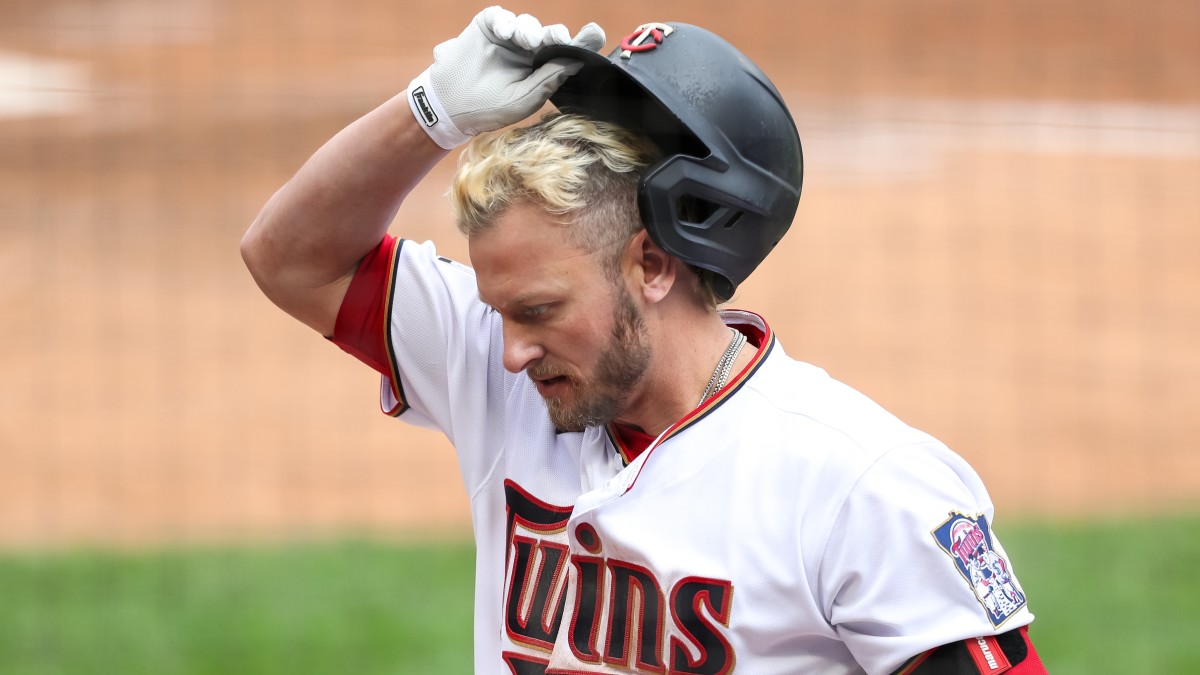
26. Minnesota Twins (LW: 24)
I guess the biggest surprise here is just how low the Twins have sunk. This team won 101 games in 2019 and had the second-most wins in the AL last year, and now Minnesota has the worst record in the majors. The Twins have reached this nadir with the help of some unfortunate luck—they’re an AL-worst 4–8 in one-run games and 0–7 in extra innings. Health has also been a real backbreaker, with Byron Buxton’s hip injury representing the biggest obstacle. Minnesota leaned on a stout bullpen last year, and that group’s been a complete disaster so far in '21. FanGraphs gave the Twins a 63.3% chance to make the playoffs on Opening Day, odds that have since plummeted to under 10%.
25. Texas Rangers (LW: 22)
Before this season, 28-year-old Adolis García had 24 unimpressive big league plate appearances to his name and a .266/.308/.499 career slash line in the minors. So it’s fairly surprising that, in 32 games, he leads the Rangers in home runs (10) and RBIs (27), while hitting .289/.336/.570 in 131 plate appearances. García struck out a lot in the minors and is striking out a lot now, so perhaps opposing pitchers will find ways to exploit him in the long run. Still, his unexpected success represents perhaps the best story line for a last-place team that’s lost its last six games.
24. Arizona Diamondbacks (LW: 26)
The only answer here is catcher Carson Kelly, who’s making the Paul Goldschmidt trade look not so bad for Arizona. His .491 on-base percentage would lead the majors if he had enough at bats to qualify, and he has more walks (23) than strikeouts (16). Unfortunately, he probably won’t end up qualifying for the official leader boards after suffering a fractured toe that landed him on the injured list on Saturday.
23. Los Angeles Angels (LW: 23)
The most surprising part of this Angels' season is that Shohei Ohtani has been so great—and so durable—and yet the team is still not able to find its footing. Ohtani has appeared in all 39 games this season. He’s tied for the major league lead in home runs (12) and extra-base hits (24) while posting a 2.10 ERA with 40 strikeouts in five starts on the mound. His game-winning home run with two outs in the ninth inning against the Red Sox on Sunday was emblematic of the Angels as a whole, as it was an incredible feat that saved the team from losing its fifth game in a row.
22. Kansas City Royals (LW: 19)
When he signed it in February, Hunter Dozier’s four-year, $25 million contract extension looked like a team-friendly contract that the Royals must have been thrilled with. It’s too soon for any talk that the deal will go bust, but Dozier has really struggled to start this season. He’s still hitting the ball hard and is actually posting the highest barrel rate (12.8%) of his career, but he’s basically stopped hitting the ball the other way, with 11.5% of batted balls going to the opposite field. Dozier hit .423 against traditional (pull side) shifts in 2019 and .317 last year. In 34 plate appearances this year, he’s batting .029 with no extra-base hits and a 44.1% ground ball rate.
21. Washington Nationals (LW: 25)
Josh Bell has been less valuable (by fWAR) at first base for the Nationals than the recently released Albert Pujols was for the Angels, which isn’t what they had in mind when acquiring the 2019 All-Star from Pittsburgh during the offseason. Bell raked in spring training, but had to miss two weeks on the COVID-19 list and hasn’t fully gotten his timing back. His paltry .156/.219/.333 slash line isn’t indicative of his hard-hit rate and average exit velocity, which rank in the 90th percentile, so perhaps a turnaround is in sight. Patrick Corbin, who has the highest home run rate (2.48 HR/9) and expected ERA (6.58) among all starters, also bears mention.
20. Chicago Cubs (LW: 20)
Kyle Hendricks was a picture of consistency during his first seven seasons in Chicago, never posting an ERA above 4.00 or an opponent's batting average above .250. But hitters are batting .311 against him this year to ring him up for a 5.27 ERA, even after he pitched eight innings of one-run ball against the Tigers on Sunday. Perhaps Hendricks just needs to avoid facing the Braves; he’s allowed 14 runs in 7.2 innings against Atlanta this year, and 11 runs in 35 innings against everyone else.
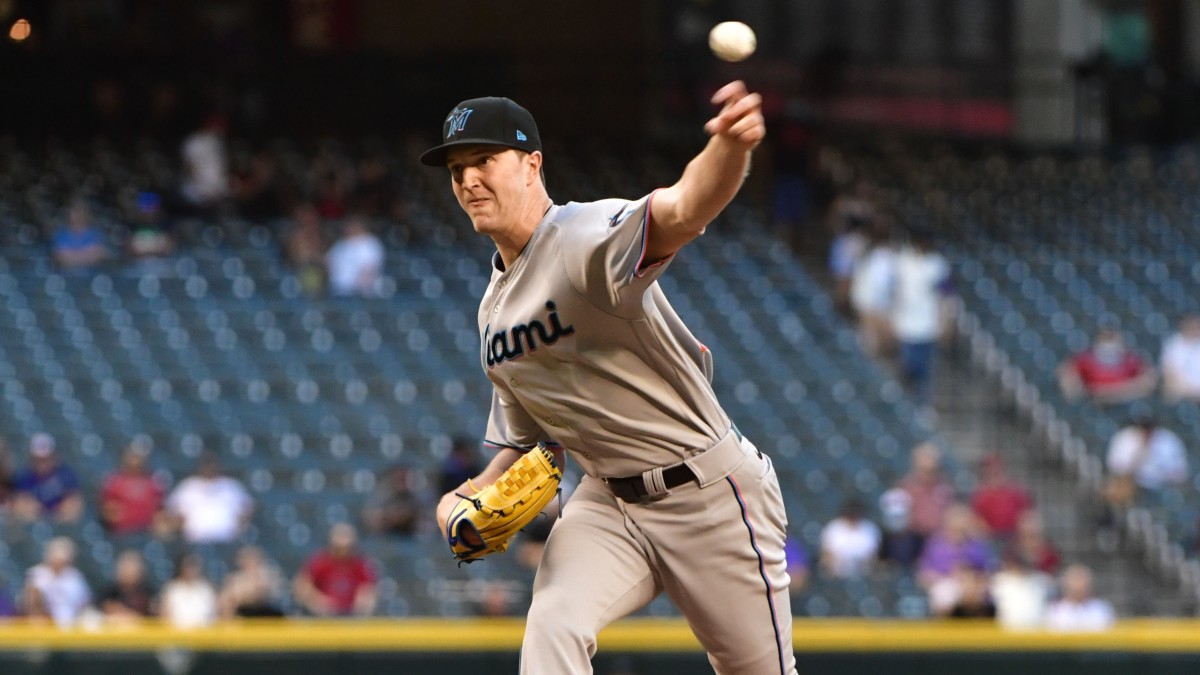
19. Miami Marlins (LW: 21)
Trevor Rogers is pitching like a dark horse Cy Young candidate. The 23-year-old southpaw, who maintained his rookie status after managing just a 6.11 ERA in 28 innings over seven starts last season, ranks in the top five of ERA (1.84) and opposing hitters’ barrels rate (4%). He has already outdueled Jacob deGrom, has allowed just two home runs in 44 innings and has the stuff to be a part of Miami’s next championship and subsequent fire sale.
18. Atlanta Braves (LW: 15)
Huascar Ynoa looked overmatched last year in five regular-season starts, but the 22-year-old has been overmatching opponents on the mound and at the dish in 2021. His powerful fastball (which touches 99 mph) and slider combo, with an occasional curve and sinker mixed in, have resulted in a 3.02 ERA in nine games. He’s also been the best two-way player this side of Ohtani, with two homers, a double and three singles in 17 at bats.
17. Seattle Mariners (LW: 18)
The biggest surprise for the Mariners is Chris Flexen, the 26-year-old righthander who had an 8.07 career ERA through 2019 and spent '20 pitching in the KBO. He thrived there and earned himself a big league contract this winter, and is now making the Mariners look like geniuses for giving him a chance on a multiyear deal. Flexen is 4–1 with a 3.46 ERA through seven starts, allowing one run or fewer in four of them.
16. Cincinnati Reds (LW: 17)
Even in what may end up being remembered as the golden age for no-hitters, the soft-tossing Wade Miley wasn’t seen as a likely candidate to join the no-hitter club. But it was no fluke; Miley has been a master at limiting hard contact as the owner of the league’s lowest hard-hit rate (20.5%) among qualified starters. The current runner-up on the hard-hit leader board? Luis Castillo (21.5%), who’s been subjected to some extraordinarily bad luck as hitters have posted a league-high .380 BABIP against him to send his ERA all the way up to 7.71 through eight starts.
15. Milwaukee Brewers (LW: 11)
Keston Hiura established himself as the second baseman of the future for Milwaukee in 2019 after registering a .938 OPS with 19 home runs in 348 plate appearances of a promising rookie campaign. But the former first-round pick led the league in strikeouts last season and was slashing .152/.247/.266 with just one home run in 89 plate appearances and a meager 54.2% zone contact rate before he was sent down to Triple A on May 3. He’s also mostly been playing first base after the signing of Kolten Wong, so his bat doesn’t play up as much.
14. Philadelphia Phillies (LW: 14)
Nick Maton, ranked by MLB.com as Philadelphia’s No. 17 prospect, has filled in well at the middle infield spots for Jean Segura and Didi Gregorious, and in fact has a higher OPS than either of them after hitting his first two career home runs on Sunday. He’s basically been what Phillies fans hoped Scott Kingery would be, but as an unheralded prospect, he has an even better shot at becoming a fan favorite in Philly.
13. New York Mets (LW: 12)
Aside from the Mets somehow being in first place, Francisco Lindor’s Mets tenure has gotten off to a nightmarish start since signing his 10-year, $340 million extension. The season-long slump at the plate. The “ratcoon” incident. This hair choice. He’s still sitting below the Mendoza Line with just three home runs, and hasn’t looked like the same player who made four All-Star games with top 15 MVP finishes to match in Cleveland between 2016–19. Even his defense, which won him two Gold Gloves, has been below average with -1 defensive runs saved.
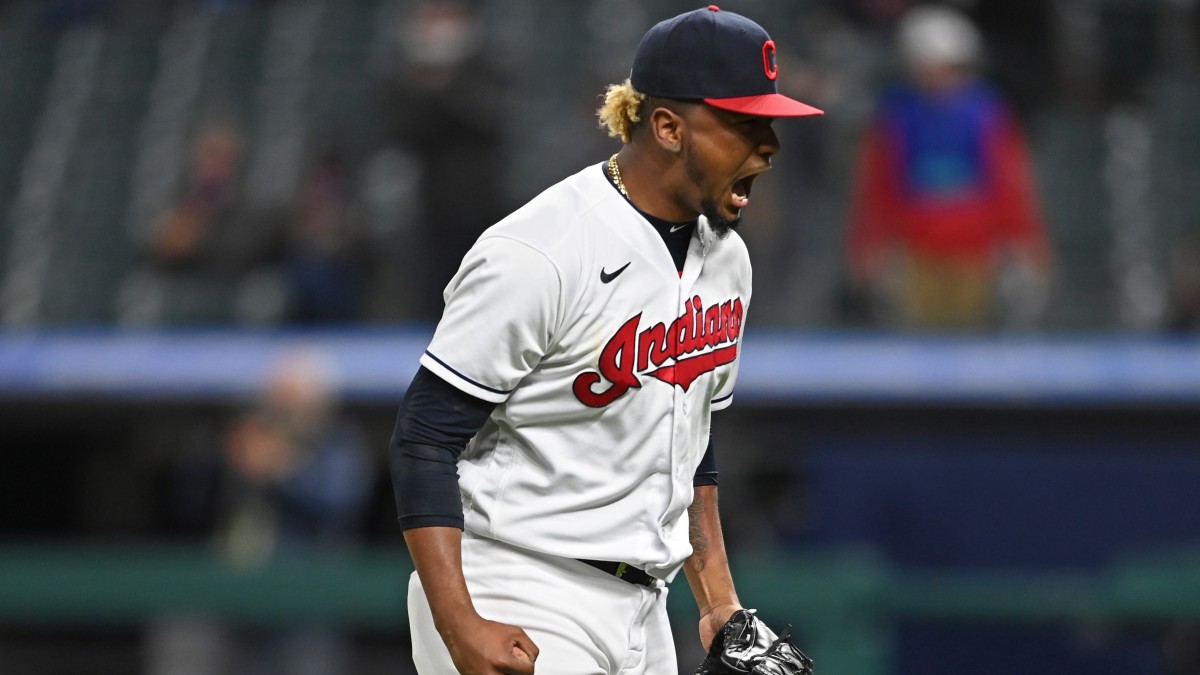
12. Cleveland (LW: 13)
Maybe it’s not such a big surprise that Emmanuel Clase is good, but even his biggest fans couldn’t have imagined he’d be this good, this quickly. Clase has a 1.00 ERA through 18 innings, generates ground balls at a ludicrous 72.2% clip and throws a 100-mph cutter. He’s been this dominant while also being a tad unlucky—opposing hitters are batting .308 against that cutter but have managed only a .346 slugging percentage, with an expected batting average of just .235. At 23, he’s already one of the most dominant and effective relief pitchers in the game.
11. Tampa Bay Rays (LW: 16)
The Rays always seem to find diamonds in the rough, but what they’ve gotten out of 41-year-old Rich Hill represents a new level of treasure hunting. Signed for just $2.5 million this past winter, Hill has made eight starts with a 4.26 ERA and 41 strikeouts in 38 innings. His production isn’t the surprising part, though: It’s that he’s yet to miss a start eight times through the rotation. In his later years, Hill has been consistently effective but typically missed time here and there due to injury and didn’t often pitch deep into games. His ERA from 2015–20 was 2.92 in over 500 innings, and his expected ERA this season is 3.33, so he actually could be in store for improved results going forward.
10. St. Louis Cardinals (LW: 8)
Last year, Yadier Molina logged a .662 OPS, the second-worst mark of his career and what seemed like a sure sign of decline. Now, at age 38 as the second-oldest player in the National League (behind only batterymate Adam Wainwright), Yadier Molina has a career-best .899 OPS and is on pace to set a career high for home runs after collecting his first career home run at San Diego’s Petco Park, oddly leaving Coors Field as the only NL ballpark he hasn’t homered in. It just goes to show you that even the most stable players in the game can surprise you.
MARTELL: How Buster Posey and Yadier Molina Are Turning Back the Clock
9. San Francisco Giants (LW: 7)
Buster Posey is another older catcher who’s never been hotter at the plate, but the successful reclamation projects of Anthony DeSclafani and Alex Wood have gone better than anyone could have expected. They’ve combined for a 1.97 ERA in 14 starts with just six home runs allowed in 82.1 innings. They’re also earning just a combined $9 million in 2021. Farhan Zaidi has helped build a rotation with an MLB-best 2.76 ERA after the unit ranked 21st with a 4.99 ERA last season.
8. Toronto Blue Jays (LW: 9)
The back end of Toronto’s bullpen has been a revolving door so far, with six different players recording saves. Not included among that sextet—yet perhaps the group’s most important pitcher—has been veteran righthander Tyler Chatwood. There’s a saying that most good relief pitchers are failed starters, and though that feels a tad harsh, Chatwood appears to have blossomed in a full-time relief role after having mixed results as a starting pitcher. In 13 games, he’s struck out nearly 40% of opposing hitters and hasn’t yet allowed a home run. Chatwood’s gotten to this point by leaning on his cutter, throwing it 47.1% of the time with a .107 batting average against and a 46.3% whiff rate.
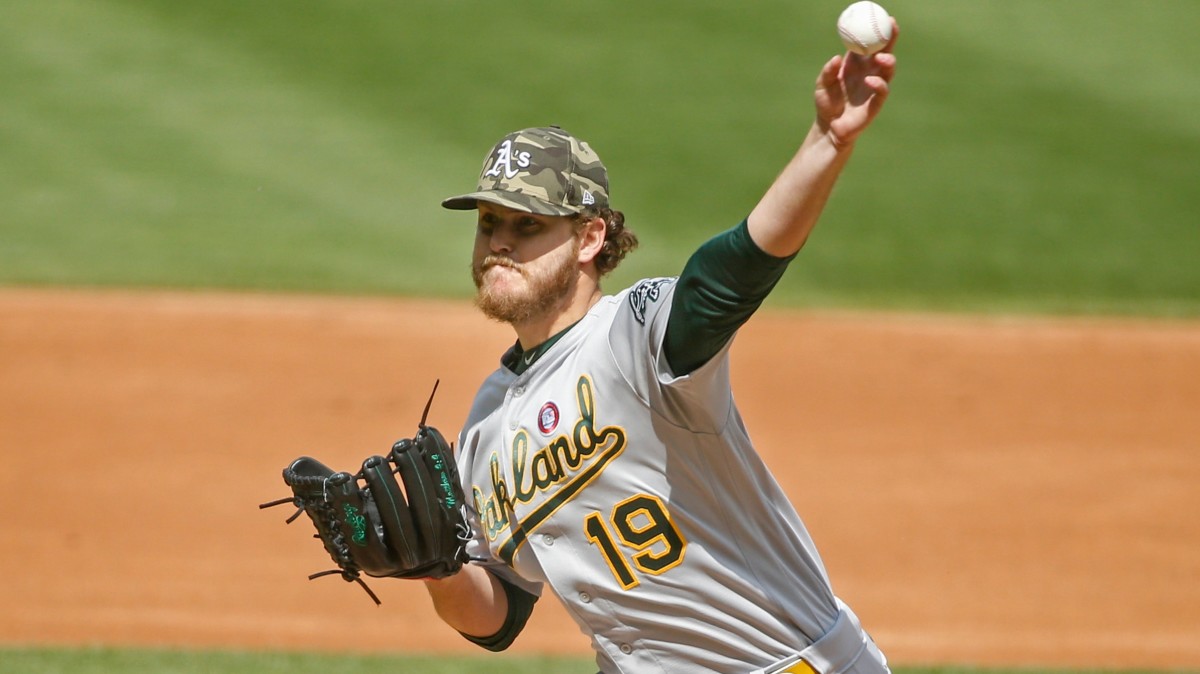
7. Oakland Athletics (LW: 10)
Cole Irvin put up a 6.75 ERA in 45.1 innings with the Phillies from 2019–20, so it didn’t make many waves when he was traded to Oakland for cash considerations in January. He’s making waves now, with the lowest ERA (3.02) on the A’s staff and the second-most innings (47.2). Irvin doesn’t throw gas, but his pitch mix keeps hitters off-balance and makes his fastball effective. Opposing batters have hit just .178 against it so far despite the four-seamer sitting at just over 90 mph.
6. New York Yankees (LW: 4)
Opinions were a bit mixed on what to expect from the Yankees’ starting pitching heading into the season, but the rotation's biggest supporters likely didn’t envision Yankees' starting pitching being the best in the AL to this point. New York’s rotation ranks first in the league in fWAR (4.6) and sports a 3.46 ERA. Gerrit Cole has been excellent, but so too have Corey Kluber and Domingo German. Jordan Montgomery and Jameson Taillon have each had their ups and downs, but they’ve at least been durable to this point.
5. Los Angeles Dodgers (LW: 6)
Zach McKinstry, a former 33rd-round pick, was fulfilling Los Angeles’s annual quota for its out-of-nowhere offensive star before suffering a strained oblique on April 20. The 26-year-old lefty compiled an .883 OPS while starting games in right field, left field and second base, and should be back at Chavez Ravine soon after starting a minor league rehab assignment over the weekend.
4. Boston Red Sox (LW: 2)
Boston’s entire rotation qualifies as a surprise, as the group has outperformed expectations. Of all Red Sox starters, Martín Pérez's success has been the most unexpected. The southpaw had a 4.71 career ERA in nearly 1,000 innings before this season, and hadn’t had a sub-4.50 ERA since 2016. Through eight starts in '21, Pérez has a 3.40 ERA and a career-best 21.3% strikeout rate.
3. San Diego Padres (LW: 3)
Ryan Weathers—at 21, the youngest pitcher in the majors—was a surprise addition to San Diego’s postseason roster last year and made the 2021 Opening Day roster despite having just 114.1 minor league innings under his belt. The No. 7 pick of the '18 draft is clearly ready for showtime, recording a 1.37 ERA in 26.1 innings, including four starts while filling in for Dinelson Lamet in the Padres' rotation. The most impressive of those was against the Dodgers, whom he held to one hit over 5.2 innings on April 22—six days after he one-hit them over 3.2 innings. It’s not hard to imagine him sticking around for 19 seasons, like his father, David.
2. Houston Astros (LW: 5)
Before the 2020 season, righthander Luis García had never pitched above the high-A level before reaching the majors for six appearances last year, including a two-inning start in the playoffs. He’s put up a 3.34 ERA with 40 strikeouts in 35 innings this season, picking up his first career win on Saturday. García has been part of a strong Astros rotation that’s performed well across the board in '21, though will have to manage the absence of José Urquidy, who went on the IL with a shoulder injury. That means García could be leaned on even more, though the 24-year-old has proven himself more than capable of the challenge.
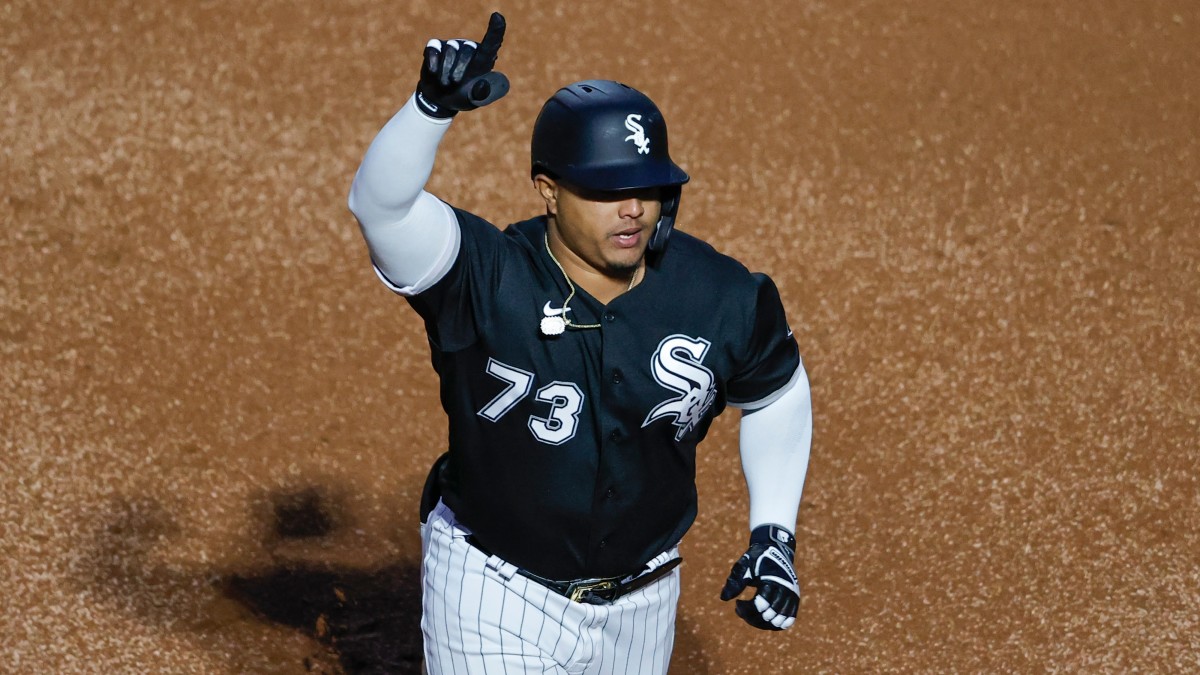
1. Chicago White Sox (LW: 1)
Raise your hand if you had Yermín Mercedes's leading the league in batting average through the first quarter of the season. The White Sox have seemingly not missed a beat despite extended absences from young stars Eloy Jiménez and Luis Robert, and Mercedes is a big reason why. Mercedes spent nearly a decade in the minor leagues and playing independent ball before finally reaching the majors. Nobody expects him to sustain his .406 BABIP all year long, but who cares about that right now? The White Sox are talented and deep enough to not be knocked off course when regression finally hits for their 28-year-old rookie. Until that time comes, let’s all enjoy the ride as the Yerminator continues to tear through opposing pitchers like he did his eponymous “Yerminator Burger” at the South Side restaurant Fabulous Freddie’s.
More MLB Coverage:
• LAWS: Sizing Up an NL Cy Young Race Without Jacob deGrom
• BACCELLIERI: Inside Minor League Baseball's Long-Awaited Return
• SELBE: Pujols Joining Dodgers Is One Last Shot at a Proper Exit
